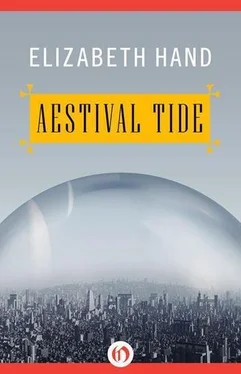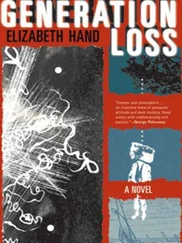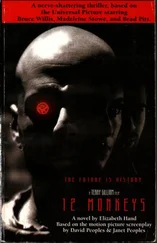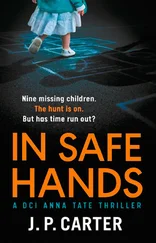Elizabeth Hand - Æstival Tide
Здесь есть возможность читать онлайн «Elizabeth Hand - Æstival Tide» весь текст электронной книги совершенно бесплатно (целиком полную версию без сокращений). В некоторых случаях можно слушать аудио, скачать через торрент в формате fb2 и присутствует краткое содержание. Жанр: Фантастика и фэнтези, на английском языке. Описание произведения, (предисловие) а так же отзывы посетителей доступны на портале библиотеки ЛибКат.
- Название:Æstival Tide
- Автор:
- Жанр:
- Год:неизвестен
- ISBN:нет данных
- Рейтинг книги:3 / 5. Голосов: 1
-
Избранное:Добавить в избранное
- Отзывы:
-
Ваша оценка:
- 60
- 1
- 2
- 3
- 4
- 5
Æstival Tide: краткое содержание, описание и аннотация
Предлагаем к чтению аннотацию, описание, краткое содержание или предисловие (зависит от того, что написал сам автор книги «Æstival Tide»). Если вы не нашли необходимую информацию о книге — напишите в комментариях, мы постараемся отыскать её.
Philip K Dick Award (nominee)
Æstival Tide — читать онлайн бесплатно полную книгу (весь текст) целиком
Ниже представлен текст книги, разбитый по страницам. Система сохранения места последней прочитанной страницы, позволяет с удобством читать онлайн бесплатно книгу «Æstival Tide», без необходимости каждый раз заново искать на чём Вы остановились. Поставьте закладку, и сможете в любой момент перейти на страницу, на которой закончили чтение.
Интервал:
Закладка:
“If you will please lie down we can begin the examination,” crooned the Anodyne Physician.
Hobi looked around a little desperately. “Nasrani,” he called out, finally sighting him in a dim corner.
“I saved them,” explained Nasrani, walking with care to join the boy. In one hand he cradled another of the tiny monads, this one with dragonfly’s wings of transparent blue glass. “It took years—I watched every ’file I could find, read everything I could about them. They had all been perverted from their original uses, as weapons or medics or intelligence units. Except for these, of course.”
He held up the monad. Its wings whirred and it rose into the air a few inches above his palm. “Monitors, to watch children. Or maybe they were toys. By the time they ended up here no one remembered why they had been made.” He watched the graceful creature dart across the room, then sighing left Hobi among the small crowd of replicants.
Hobi watched him, curious. The exile seemed to have forgotten him: he crossed to the darkest end of the room and there stood brooding in front of a cabinet that Hobi had not noticed earlier.
“Nasrani?”
The exile said nothing. Gently the boy pushed away the Anodyne Physician’s probing hands and went to Nasrani, stepping carefully over flickering candles until he reached the cabinet. Nasrani stood in silence, one hand tracing the edge of a delicate golden handle in the front of the case.
Hobi had never seen anything like it before. A kind of sarcophagus of glass and chromium, with pale blue and yellow and pink tubes curved about its crown. Nucleoceptive fluid flowed through the tubes, silvery bubbles rising in long streamers until they disappeared at its top. Behind them the other replicants and robots hissed and clattered while the candles died and the air grew soft with the scent of burning wax. In front of him the sarcophagus glowed painfully bright, vivid rose shot with deep blue highlights. But he couldn’t make out what was within the case—the light had a peculiar clouded quality, as though it were heavily filtered; as though whatever was inside were so brilliant it would blind whoever gazed upon it. Still, after a moment or two his eyes grew accustomed to it. He glanced at Nasrani, but the man still paid him no notice. Hobi stepped closer to him and leaned forward to see what was inside.
Ever after, he remembered this moment as the one that changed his life: an instant when all the real sounds—Apulieus intoning to Maximillian Ur, the Automated Tenor doing scales, even Nasrani’s soft breathing—died, and he heard from somewhere else a single clear note, as though a glass bell had been struck. Nefertity would tell him he had imagined it, but Hobi had never imagined anything in his life. The sound was real as the figure in the case before him.
It was a woman: a woman of glass. He could see her veins, filaments of glowing jade and cerise, twisting around joints of silver metal. Her ribs curved like two hands cupping the softly glowing air, and behind them, where a human heart would be, was a sphere of the most perfect gold. Electrical fibers chased across it, and when Hobi touched the front of the sarcophagus threads of light streamed toward him. Even her face was transparent. It was as though someone had taken a living woman and replaced all her inner atomies with ice and crystal. Everything except her eyes. They glowed through translucent eyelids, beneath lashes that were like splinters of light—orbs like globes of living water, the deepest green he had ever seen. At the corner of each was a drop of blood. As he gazed transfixed her eyelids flickered. Blood welled from each eye and spilled to the bottom of the sarcophagus.
“Only when she sleeps,” whispered Nasrani. He too had outstretched his hand to graze the glass above her cheek. “Because then she dreams that she is human.”
“She’s beautiful,” said Hobi, hardly daring to speak. And she was: in spite of the arcane array of metal and glass, her antique, almost doll-like features, she was breathtakingly lovely. “What— who —is she?”
Nasrani only stared at her without answering. After a moment Hobi asked again. Nasrani turned away, to look out at the room where the other replicants engaged each other in witless conversations. When he spoke his voice was soft, almost a whisper.
“She is a nemosyne. One of the memory units devised after the First Ascension, when people feared that the holocausts would destroy all records of humanity. They were designed and then given to various wise men and women, who programmed them to record, oh, everything. There were nemosynes for agriculture and meteorology, oceanographic units and military units and units that had entire libraries of books and films and ’files on them.”
Hobi shook his head. “What happened to them?”
Nasrani shrugged. “Like everything else, they were destroyed over the centuries; most of them at least. But some must have survived—this one did—and probably they are out there now, keeping their secrets until we can find them and learn from them again.”
In the silence Maximillian Ur’s blades whickered and snapped, and Apulieus scolded noisily. Finally, Nasrani said, “If we could find them, we could rebuild the world. We could locate and renew the fallen cities. We could find the lost arsenals and defeat our enemies at last, and end the wars with the Emirate and the Commonwealth. We could do anything, if we could find more of these—they have blueprints for machines and computers, they could teach us how to stop the plagues, how to repair the starships, how to revive the poisoned deserts. They remember everything.”
He fell silent, staring at the imprisoned nemosyne.
Hobi pressed his face against the cool glass. From inside he could hear a very faint whirring, a sound more like running water than the pulse of circuitry. She had skin of some very thin fine metal stretched across the sharp planes of her cheeks and jaw. As he stared the translucent skin shivered, and her eyelids trembled.
“How do you know?” he asked at last.
Nasrani shook his head. “I found ’files about them. I even have records of where some of them were stored. But those cities are dead now, and the nemosynes like everything else in them were destroyed. Or else they are waiting until we find and wake them once again.”
His eyes as they gazed at the nemosyne were brilliant, almost feverish. For the first time Hobi noticed what an odd color they were. Nasrani’s voice rose plaintively.
“But I can’t even figure out how to get this one to operate correctly! All she will do is state her operating history and serial number. Sometimes she recites things at random, things from her datafiles. She was a storage unit for minority histories. Women’s folktales. Poems. Useless things—she’ll recite them forever. But I can’t get any response beyond that. She won’t answer my questions.”
His annoyance faded. “She is still half-asleep, and I don’t know how to wake her,” he ended sadly.
“Wake her,” murmured Hobi. He gazed with wide brown eyes at the glass woman, once more rested his cheek against hers to listen to her receptors softly pulsing.
“If I could wake her,” Nasrani went on, “ I could find out about the rest. They were supposed to be linked. I might even be able to access the others, if they still exist.”
“What would you do with them? I mean, if you could talk to them?”
Nasrani straightened, glanced at the boy, and cleared his throat.
“The world is too large now,” he said, as though addressing an audience. “Too small in some ways—how many people here, besides the Aviators, have ever been Outside? But too large as well. Too difficult to travel Outside, too many dangers, too many enemies. The nemosynes could— teach us —things.”
Читать дальшеИнтервал:
Закладка:
Похожие книги на «Æstival Tide»
Представляем Вашему вниманию похожие книги на «Æstival Tide» списком для выбора. Мы отобрали схожую по названию и смыслу литературу в надежде предоставить читателям больше вариантов отыскать новые, интересные, ещё непрочитанные произведения.
Обсуждение, отзывы о книге «Æstival Tide» и просто собственные мнения читателей. Оставьте ваши комментарии, напишите, что Вы думаете о произведении, его смысле или главных героях. Укажите что конкретно понравилось, а что нет, и почему Вы так считаете.












